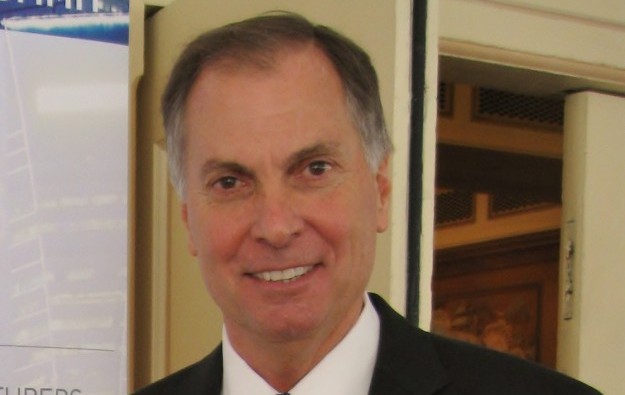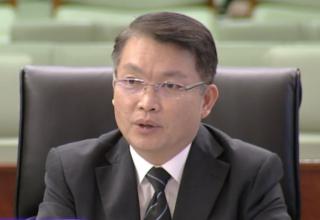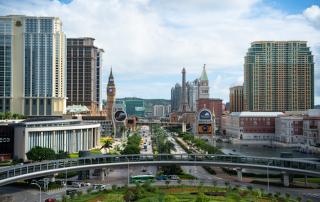Crunch time for Tokyo casino option: Caesars exec
Jul 11, 2017 Newsdesk Interviews, Japan, Latest News

The Tokyo local election setback for Japan’s governing Liberal Democratic Party (LDP) is unlikely to affect the will of the national government to pass the Integrated Resorts (IR) Promotion Bill for that country’s casino industry.
So said Steven Tight (pictured), president of international development for U.S.-based casino group Caesars Entertainment Corp, in an interview with GGRAsia. He had confirmed during a May conference that the group is actively pursuing a casino licence for Japan.
“From my understanding I don’t believe this [election result] is going to impact the ability to pass the [national] implementation bill. From a regional perspective, I think Tokyo may not be interested in pursuing this [casino opportunity] initially, but I don’t think it will hold up or prevent the passage of the implementation bill,” he told us.
Brokerage Union Gaming Securities Asia Ltd had said in a note on July 5 that the loss of nearly two-thirds of the LDP’s local seats in the recent Tokyo Metropolitan Assembly election might make it harder for Prime Minister Shinzo Abe to build the political consensus needed to pass the casino industry implementation measure.
Caesars’ Mr Tight told us: “My understanding is they are still on track for the passage of the implementation bill by the end of this year.”
The executive further stated: “I do think the government is still committed to trying to move this forward as quickly as possible in order to start to generate the economic benefits that the initiative will likely generate.”
Lukewarm Tokyo
Investor services firm Morningstar Inc said in a recent report it thought Japan’s capital Tokyo was likely to have put itself out of the running for a casino resort. Morningstar cited factors including the city’s focus on preparation for the 2020 Summer Olympics, and the lack of clarity on a preferred site for a casino.
Tokyo Citizens First Party, the locally focused party of the city’s current Governor, Yuriko Koike, increased its representation following the Tokyo poll.
The official – who came to office in July 2016 – said in an interview last year she was in favour of a casino resort for Tokyo. But Bloomberg News recently reported that Ms Koike “hasn’t made casinos a priority”.
Caesars Entertainment’s Mr Tight told us: “Tokyo is going to have to decide whether it wants to be involved in this initiative in the first phase or not.”
The executive noted that his company welcomed informed debate in Japan about “integrated resorts” – an industry euphemism for casino venues that also host events, conferences, restaurants and shops.
“The public I don’t think has as strong an understanding [as that enjoyed by Japanese lawmakers] about integrated resorts; because they’ve never had them before,” he told GGRAsia.
Mr Tight added the company sought to assist the debate via a video it is making.
“We are right now filming a video that will be offered in Japan – and on a number of different platforms – and will show a day in the life of an integrated resort… so they understand as a Japanese local what they would be able to enjoy at an integrated resort, with all the various forms of entertainment; but also, from an employment perspective, what kind of jobs they might expect [to be available],” he said.
“I think that will help educate the public: I think that will be tremendously helpful,” Mr Tight added.
Sensitive issues
“I think so much of it has to do with education, with reassuring the government and the public on the issues they are most sensitive about, whether it be gaming addiction or concerns about crime, or any other social cost mitigation,” the Caesars executive said.
“I think they [the Japanese authorities] are starting now to draft the appropriate bills [legislation] to provide the necessary assurance to the public… that this will be extremely well managed and responsibly managed.”
Banking group Morgan Stanley suggested in a May note that the passage by Japan’s parliament of a bill to counter gambling addiction would be “a key indicator” for the opening of casino resorts in the country and must in likelihood happen before the IR Implementation Bill can proceed.
The implementation law might be passed in the 2017 extraordinary parliamentary session starting in the autumn, suggested Morgan Stanley.
Mr Tight told us: “As Prime Minister Abe has said, it will be probably one of the most stringent regulatory environments in the world. And I think that’s what’s required for them to feel comfortable moving forward.”
He added: “In our case, we have been active in Japan and in discussions with the government for literally 15 years… As a result we have met with government over the last number of years and had a lot of very frank and honest discussion about what they’re looking for, what we have to offer, how we think that we’re differentiated and why we think we’re the best-positioned operator to bring the sort of benefits that Japan is looking for, especially around issues on gaming addiction.”
Caesars Entertainment has said it plans to expand its business after its largest unit emerges from bankruptcy later this year. The company has struggled since a US$30-billion leveraged buyout, led by private equity firms Apollo Global Management LLC and TPG Capital Management LLP, in 2008. But Mr Tight stressed in comments during a May conference in Japan that access to cash for a Japan project “wouldn’t be an issue”. Several licence suitors have mentioned a possible US$10-billion spend to realise a Japan project.
South Korea project
During his interview with GGRAsia, Mr Tight gave some update on development of the group’s first Asian casino resort – that will be licensed to serve only foreign gamblers – at Incheon in South Korea.
He said the scheme had been slowed “a little bit” by the need for its business partner in the venture to obtain licensing as a contractor to build it.
“They have done some initial site work and some additional soil investigation, which requires a bit of remediation [work]. The site fencing is going up, and we are starting major site works probably in late July, early August. The current targeted completion date is mid-2020,” Mr Tight told GGRAsia. He added: “That’s phase one – the primary scope of work. We have a little bit of land available for expansion in a second phase.”
Mr Tight confirmed the budget was still US$700 million “for the bricks and mortar”, adding, “with financing it’s about US$800 million”.
A recent political row between China and South Korea about the siting in the latter of a U.S.-supplied missile system, was followed by a decline in the number of Chinese tourists to South Korea. GGRAsia asked Mr Tight whether the company was concerned it could affect business at Incheon.
“Given the fact it will be 2020 when we open… and looking at these [geopolitical] cycles, we are optimistic that everything will be resolved, and that tourism will continue to be growing in Korea, especially from China,” he said.
GGRAsia also asked Mr Tight whether having a foreigner-only casino in South Korea – where such existing venues commonly draw in Japanese players – would be at odds with bidding for a Japan casino permit.
He stated: “With our Total Rewards loyalty programme we are able to offer something different for our loyal customers, and we can move them around from resort to resort.”
Mr Tight added: “For those Koreans who have had a taste of the non-gaming from Caesars in Incheon, and want to experience the gaming aspect of the entertainment, we’ll be able to attract them to Japan and bring incremental visitation to Japan, and vice versa.”
Related articles
-
 Shin Hwa plans to issue nearly US$26mln...
Shin Hwa plans to issue nearly US$26mln...Nov 12, 2024
-
 Paradise Co’s 3Q net income down...
Paradise Co’s 3Q net income down...Nov 08, 2024
More news
-
 GKL provides its new table game...
GKL provides its new table game...Nov 22, 2024
-
 The Baron Upright, a new cabinet from...
The Baron Upright, a new cabinet from...Nov 22, 2024
Latest News
Nov 22, 2024
Casino operator Grand Korea Leisure Co Ltd (GKL) says it has achieved its first commercialisation of a new-to-market table game, developed via an in-house competition dating to 2021. Grand Korea...Sign up to our FREE Newsletter
 (Click here for more)
(Click here for more)
Pick of the Day
”As we navigate the final steps of the licensing process, we remain confident in our ability to align with Brazil’s regulatory requirements”
Eusebio Tanco
Chairman of DigiPlus Interactive
Most Popular
 Macau to get 36mln visitors in 2025: Secretary Lei November 21, 2024
Macau to get 36mln visitors in 2025: Secretary Lei November 21, 2024  Gaming technology firm IGT reports hacking incident November 21, 2024
Gaming technology firm IGT reports hacking incident November 21, 2024  EBITDA a focus in Macau market share battle: Jefferies November 21, 2024
EBITDA a focus in Macau market share battle: Jefferies November 21, 2024  Macau 2025 GGR could top US$30bln govt forecast: Citi November 20, 2024
Macau 2025 GGR could top US$30bln govt forecast: Citi November 20, 2024  Macau big-event outdoor venue gets trial run Dec 28: CE November 20, 2024
Macau big-event outdoor venue gets trial run Dec 28: CE November 20, 2024









